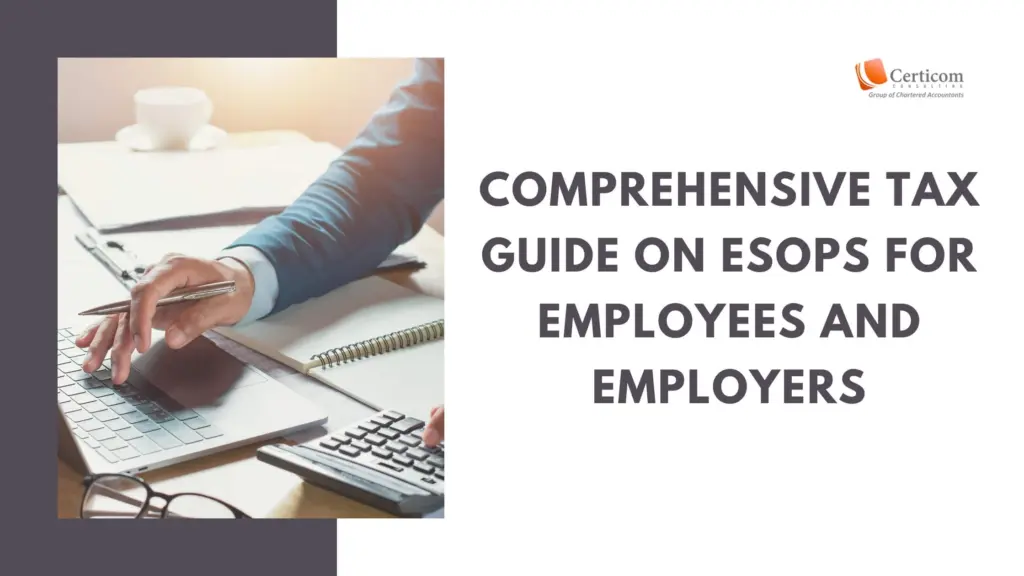Comprehensive Tax Guide on ESOPs for Employees and Employers

Employee Stock Options (ESOPs) are a popular benefit offered by organizations to reward and retain employees. They allow employees to purchase company shares at a predetermined price, often below market value, giving them a stake in the company’s growth. While ESOPs provide significant advantages to both employers and employees, they also involve tax implications at various stages.
Understanding ESOPs: A Win-Win Strategy
An ESOP grants employees the right to buy company shares at a future date at a fixed price, typically lower than the market value. These options, however, are conditional on employees rendering service for a specified period, known as the vesting period. While ESOPs enhance employee motivation and align their interests with the company’s growth, they also bring along tax considerations that need to be addressed.
Tax Implications of ESOPs for Employees
Taxation of ESOPs for employees occurs in two phases:

1. At the Time of Exercise
When an employee exercises their stock options, the difference between the Fair Market Value (FMV) of the shares and the exercise price is considered a taxable perquisite under Section 17(2)(vi) of the Income Tax Act, 1961.
Fair Market Value (FMV):
- For Listed Shares:
- If traded on a single recognized stock exchange: The FMV is the average of the opening and closing prices on the exercise date.
- If traded on multiple exchanges: The FMV is based on the exchange with the highest trading volume.
- If no trading occurs on the exercise date, the FMV is the closing price on the nearest preceding trading day.
- For Unlisted Shares:
- The FMV is determined by a merchant banker on the exercise date or any date within 180 days preceding the exercise date.
- For Listed Shares:
Tax Deduction at Source (TDS):
Employers must deduct tax on the perquisite value. However, startups eligible under Section 80-IAC benefit from a TDS deferral option. In such cases, tax is deducted within 14 days of the earliest of the following events:- 48 months from the end of the relevant assessment year.
- Sale of the ESOP by the employee.
- Termination of the employee’s service.
2. At the Time of Sale of Shares
Once the employee sells the shares, the transaction is subject to capital gains tax.
Capital Gains Calculation:
- Purchase Cost: The FMV on the exercise date, which was taxed as a perquisite, is treated as the purchase cost.
- Gain/Loss: The sale price minus the purchase cost determines the capital gain or loss.
Nature of Capital Gains:
- Short-Term Capital Gains: If the holding period (from the date of allotment to the sale date) is less than 12 months for listed shares or 24 months for unlisted shares.
- Long-Term Capital Gains: If the holding period exceeds the above limits.
Tax Implications for Employers
Employers benefit from ESOPs as a tool for employee retention and loyalty, but they must comply with specific tax obligations:
- Perquisite Valuation and Reporting: Employers are responsible for calculating the perquisite value accurately and deducting tax at source.
- TDS Compliance: Ensuring timely tax withholding and compliance with deferred payment provisions, if applicable.
- Cost of ESOP Issuance: While not directly deductible, ESOP-related expenses may impact the company’s financial statements.

Key Takeaways for Stakeholders
For Employees:
- Understand the dual taxation stages – at exercise and sale.
- Plan your finances to manage TDS and capital gains taxes.
- Leverage holding periods to optimize tax liabilities.
For Employers:
- Ensure accurate FMV determination and timely tax deduction.
- Educate employees about the tax implications of ESOPs.
- Comply with legal requirements to avoid penalties.
By addressing the taxation of ESOPs strategically, both employees and employers can maximize their benefits while ensuring compliance with tax regulations. These options are more than just a financial instrument—they represent a shared journey of growth and success.
Related Post
Cost Inflation Index for FY 2025-26: Impact on LTCG Tax
Loan Interest Deductions: How to Claim and Avoid Tax Scrutiny
Book A One To One Consultation Now For FREE
How can we help? *




